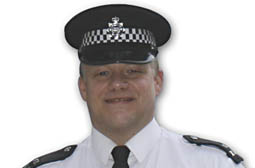| |

David Pilling |
DRUGS FIGHT 'ROBOCOP' IN HEROIN DEATH
Officer who took on West End dealers died after taking overdose
AN ALL-ACTION police officer known as “Robocop” for his tenacious attitude towards tackling drug dealers in Holborn and Covent Garden fell victim to heroin himself, an inquest heard yesterday (Thursday).
David Pilling collapsed and died at home after taking four times the amount of heroin normally associated with fatalities.
Senior officers said after an inquest at St Pancras Coroner’s Court there was no evidence that he had taken substances confiscated during arrests.
PC Pilling was found dead in his flat in Cumberland Market, close to Regent’s Park, in March. Colleagues later discovered traces of heroin at his home.
The inquest heard how drugs paraphernalia including a syringe and sterile wipes were found nearby and that his home computer contained research about preparing and injecting heroin, and the potential risks of getting addicted.
Detective Inspector Paul Clack, who investigated PC Pilling’s sudden death, said afterwards: “David was an active and committed officer, popular among his colleagues. He was involved in many drugs arrests and declared himself as being anti-drugs.”
He added: “All across society there are people who fall victim to drugs.
“David is a tragic victim of that. The Met Police has a strict line towards substance misuse but is also supportive of staff with particular problems. In this case, there were no signs that David had a problem. We have not been able to identify where the drugs came from.”
DI Clack gave evidence for 20 minutes during the hearing, attended by several friends and police officers from Holborn police station.
Tests showed that
PC Pilling was likely to have had taken illegal drugs in the past but only in three or four months leading up to his death, and coroner Dr Andrew Reid said there was “no evidence that he was dependent or addicted to opiate drugs”.
It was in the fight against drugs that PC Pilling’s reputation developed among beat bobbies in the West End, often due to arrests made when he was supposed to be off-duty or on his way home from work.
Born in Lancashire, and brought up in Canada, the 47-year-old worked for the Met for 13 years.
PC Stuart Allen said his fellow officer was “up and down but when he was up and happy he was fun to work with”. He told the inquest: “He wasn’t afraid to express his opinions to anybody regardless of rank.”
PC Pilling, who organised walking trips across Britain’s beauty spots and charity fund-raisers for the London Air Ambulance, is credited on tribute websites for rallying colleagues in efforts to unpick the entrenched heroin and crack cocaine market around Centre Point and the West End.
“He virtually destroyed the drugs market around Denmark Street all by himself and dedicated his time to terrifying everyone involved in it,” said one recollection.
During one daring bust PC Pilling chased a suspect into the subway at Tottenham Court Road on a motorbike – one of the gung-ho stunts that earned him his affectionate “Robocop” nickname.
Camden Borough Commander Dominic Clout has taken a close interest in the case and paid tribute to the “highly dedicated” officer early this year.
At the time of his death, Scotland Yard released only scant details about the circumstances of his death as speculation grew at Holborn police station in Lamb’s Conduit Street.
Dr Reid said that there was no evidence to suggest that PC Pilling had been deliberately trying to harm or kill himself when he took the drugs.
DI Clack said the sensitivity of the case made it a “difficult investigation” and added that many former colleagues were still in shock.
“They had no idea that David had taken these drugs, there just wasn’t any sign,” he added.
“Police officers are ordinary people like everybody else. They can face the same problems. I think people sometimes forget that.”
Verdict: Misadventure. |
 |
|
 |
| |
| |